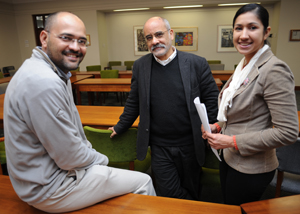African graduates struggle to find employment – survey
13 September 2010 Calling the future: Prof Haroon Bhorat (left), DVC Prof Crain Soudien and Natasha Mayet at the forum hosted by the Institutional Planning Department.
Calling the future: Prof Haroon Bhorat (left), DVC Prof Crain Soudien and Natasha Mayet at the forum hosted by the Institutional Planning Department.
The finding in a recent study that even African graduates who have graduated from historically white universities (HWI) are less likely to find employment than their white counterparts is somewhat unexpected, says UCT's Professor Haroon Bhorat.
Speaking at the first of the revived Open Planning Forums of the Institutional Planning Department (IPD) on 30 August, Bhorat and Natasha Mayet - both of the Development and Policy Research Unit (DPRU) - drew attention to some of the highlights from a 2009 Human Sciences Research Council (HSRC) study on student retention and graduation destination, particularly a section conducted by the IPD. That research looked at what has happened to some 5 491 students who graduated from seven South African universities, including HWIs and historically black institutions (HBI), at the end of 2002. (UCT did not form part of the study.)
In keeping with recent trends, researchers found that overall, 66% of white students in this cohort had graduated by 2002, far more than the 39% of Africans. And that African non-completion rates are significantly higher at HBIs (62%) than at HWIs (37%), particularly for African women (71%).
What does stand out is the figure that at the time of the survey in 2004, 42% of African graduates from HWIs had not found work - just higher than the 40% of Africans from HBIs. These numbers were also a far cry from the 10% of whites from HWIs and 6% of whites from HBIs who were still unemployed by 2004.
"The notion persists that if you control for a range of variables, including household and parental effects, then Africans who go through the same degree, the same course of study and at the same institution as whites have a lower probability of finding employment," Bhorat cautiously pointed out.
That said, he noted that the study had many shortcomings. It was at best a once-off snapshot, and more universities would need to be included in a future study to see if these trends are persistent. (For example, the IPD's Jane Hendry reported that African graduates from UCT are far more likely to find employment than their white classmates.)
The full report of the HSRC study, published by HSRC Press as Student Retention and Graduate Destination: Higher education and labour market access and success, can be downloaded here.
 This work is licensed under a Creative Commons Attribution-NoDerivatives 4.0 International License.
This work is licensed under a Creative Commons Attribution-NoDerivatives 4.0 International License.
Please view the republishing articles page for more information.







